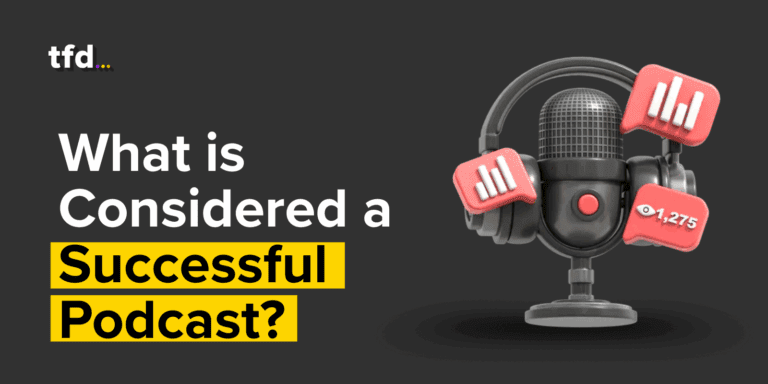In a world full of content noise, what really makes a successful podcast stand out? Is it millions of downloads, celebrity guests, or having a sleek studio setup? While these may seem like solid indicators, the real meaning of podcast success goes deeper. Knowing the characteristics of the most popular podcasts might help you on your path, whether you’re just starting out or trying to expand.
According to Abhishek Vyas, host of the TFD Podcast, community, consistency, and content that connects are more important for success than just statistics. What does success look like in the podcasting industry today?
Let’s dive into it.
Consistent Growth: A Marker of a Successful Podcast
A successful podcast must have consistent, quantifiable development over time. Whether you have 50 or 5000 listeners in the beginning, as long as your audience is expanding, you’re headed in the right direction.
Take TFD Podcast, for example. It began as a conversation hub for founders and gradually developed into one of the most valuable platforms for artists, marketers, and entrepreneurs. The trick? frequent submissions, interesting themes, and discussions that foster trust. Slow traction is more important than viral smashes.
Consistent uploads, audience engagement, and feedback integration are what separate hobbyists from serious podcasters.

Clear Target Audience: The Core of Every Successful Business Podcast
A successful business podcast knows exactly who it’s speaking to. Whether it’s start-up founders, solo creators, or side-hustlers—clarity of audience drives content, marketing, and tone.
TFD Podcast thrives by speaking directly to India’s rising entrepreneurial class. It doesn’t try to be everything to everyone. That’s the power of a niche.
If your show resonates deeply with even a small, focused audience, you’re already way ahead. Broad appeal may look good on paper, but loyal, niche audiences are what drive real impact—and ultimately, monetization.
Storytelling & Authenticity: The Soul of the Most Successful Podcasts
Regardless of the numbers, the most relatable podcasts tend to be the most successful podcasts. In addition to knowledge, listeners are drawn in by passion, true tales, and poignant moments.
Abhishek Vyas at the TFD Podcast creates space for vulnerability in addition to interviewing guests. People are drawn in by this emotional sincerity, whether it’s a creator discussing failure or a founder recounting their darkest moment.
Success is not always about being perfect—it’s about being real. If your podcast makes people feel something, it’s working.
Engagement Over Vanity Metrics
Sure, everyone loves a million plays. But every successful podcast focuses on interaction—DMs, shares, reviews, and emails. These are signals that your show is not just being heard, but felt.
If 1000 listeners are bingeing your episodes, tagging you in stories, and referring your show, you’re doing better than a podcast with 50k passive listeners.
TFD Podcast prioritizes this by repurposing clips on social platforms, engaging in comments, and building a two-way conversation with its audience. This is what keeps listeners coming back—and telling their friends.
Monetization with Meaning
Podcast success doesn’t have to mean massive ad deals. For many, podcast monetization is the by-product of building value. From brand sponsorships to paid collaborations, affiliate marketing to coaching offers—a successful business podcast finds creative ways to earn without selling out.
TFD Podcast collaborates with start-ups, personal brands, and business tools that align with its values. The aim isn’t just income—it’s integrity.
You don’t need to be the biggest show in the room—you need to be the one people trust. That’s where opportunities begin.
Stability: Still Showing Up When Others Quit
Most podcasts don’t make it past episode 10. Why? Because success takes time.
Successful podcasts play the long game. They don’t rush for results in 30 days—they build brand equity over years.
TFD Podcast has grown because it stuck with it—improving audio, refining topics, experimenting with formats, and listening to feedback.
If you want your show to succeed, don’t ask what it can do in a month. Ask what it will become in a year if you don’t quit.
Conclusion

